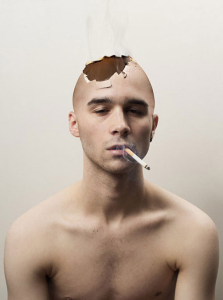Weird Feeling in Head that Comes and Goes
Experiencing a weird feeling in your head that comes and goes can be disconcerting, and while I’m not a doctor, I can offer some general information about possible causes. However, it’s important to consult a healthcare professional for a proper diagnosis and advice tailored to your specific situation.
Have you ever experienced that strange sensation in your head that seems to appear out of nowhere and then disappear just as mysteriously? You’re not alone. Many people have encountered this perplexing phenomenon, leaving them wondering about its origins, causes, and potential implications. In this article, we will delve into the world of that weird feeling in your head that comes and goes, exploring the possible reasons behind it and offering insights into what you can do to manage it.
Unraveling the Enigma
What Is That Weird Feeling?
Before we embark on our exploration, let’s define the sensation we’re talking about. This strange feeling in your head can manifest in various ways. Some describe it as a fleeting headache, while others liken it to a sudden rush or a wave of dizziness. It can be a momentary disorientation or even a tingling sensation. Despite its transient nature, this feeling can be quite unsettling. Also, read about How Much Are Hair Extensions
The Common Triggers
Stress and Anxiety: One of the most common triggers for this sensation is stress and anxiety. When our bodies are under stress, they release stress hormones that can affect blood flow and oxygen levels in the brain, leading to strange sensations.
Dehydration: Mild dehydration can cause dizziness and an odd feeling in the head. Ensuring you’re adequately hydrated may help prevent these sensations.
Low Blood Sugar: A drop in blood sugar levels, often caused by skipping meals or eating sugary foods, can lead to feelings of lightheadedness and disorientation.
Caffeine and Stimulants: Excessive caffeine or stimulant intake can sometimes result in head rushes and strange sensations. Discover more about Can You Bleach Wet Hair? Exploring the Pros and Cons
Medical Conditions
Migraines: Some individuals who suffer from migraines report experiencing peculiar head sensations, known as “auras,” before the onset of a migraine attack.As mentioned earlier, migraines often present with auras, which can include strange sensations in the head. While migraines themselves are not indicative of poor brain health, understanding their triggers and managing them can contribute to overall well-being.
Inner Ear Issues: Problems with the inner ear, such as benign paroxysmal positional vertigo (BPPV), can lead to sudden head rushes and dizziness.
Neurological Disorders: In rare cases, certain neurological conditions can cause unusual head sensations. These conditions often require medical evaluation and treatment. In some cases, weird sensations in the head can be a symptom of an underlying neurological disorder. Conditions like multiple sclerosis, epilepsy, or neuropathy can lead to unusual sensations due to disruptions in nerve function.
Medication Side Effects: Certain medications can have side effects that affect brain function, potentially leading to odd sensations. It’s crucial to discuss any new or unusual symptoms with your healthcare provider, especially if they coincide with medication changes.
Deep Breathing and Relaxation Techniques
Stress and anxiety are common triggers for weird head sensations. Learning to manage stress through deep breathing exercises, progressive muscle relaxation, or mindfulness meditation can be highly effective. These techniques help calm your nervous system, reducing the likelihood of these sensations occurring.
Maintain Stable Blood Sugar Levels
To prevent weird head sensations related to low blood sugar, aim for regular, balanced meals and snacks. Avoid excessive consumption of sugary foods and drinks, as they can lead to rapid spikes and crashes in blood sugar levels.
Monitor Triggers
Keep a diary to track when you experience weird head sensations. Note any common triggers such as stressors, specific foods, or environmental factors. This information can be valuable when discussing your symptoms with a healthcare provider.

Coping with the Uncertainty
Self-Care Strategies
If you find yourself frequently experiencing these strange sensations in your head, there are several self-care strategies you can try:
Manage Stress: Incorporate stress-reduction techniques like meditation, deep breathing, or yoga into your daily routine.
Stay Hydrated: Ensure you drink enough water throughout the day to maintain proper hydration.
Balanced Diet: Opt for a balanced diet with regular meals to stabilize blood sugar levels.
Limit Caffeine: If you’re sensitive to caffeine, consider reducing your intake of coffee and energy drinks.
When to Seek Medical Attention
While most instances of weird sensations in the head are benign and temporary, it’s crucial to recognize when to seek medical advice. Consult a healthcare professional if:
You experience these sensations frequently and they interfere with your daily life.
They are accompanied by severe headaches, visual disturbances, or other
concerning symptoms.
You have a history of migraines or underlying medical conditions.
The Importance of Professional Evaluation
If you’re concerned about weird sensations in your head, especially if they are persistent or accompanied by other symptoms like severe headaches, visual disturbances, or loss of consciousness, it’s crucial to seek a professional medical evaluation. A thorough assessment by a healthcare provider can help rule out any serious underlying conditions and provide peace of mind.
Conclusion
In the intricate landscape of the human body, weird sensations in the head that come and go can be a puzzling occurrence. Although they are often harmless and related to factors like stress or dehydration, it’s essential to pay attention to your body’s signals and seek professional guidance if needed. By understanding the potential triggers and adopting self-care strategies, you can navigate these strange sensations with greater ease.
FAQs
Are these sensations a sign of a serious medical condition?
While they are often benign, these sensations can sometimes be associated with underlying medical issues. If you’re concerned, consult a healthcare provider.
Can dehydration cause a weird feeling in the head even if I’m not thirsty? Yes, mild dehydration can occur without obvious thirst and may lead to strange sensations in the head.
Is it normal to experience these sensations during periods of high stress? Yes, stress and anxiety can lead to various physical sensations, including those in the head. Managing stress is crucial for overall well-being.
Are there specific exercises to alleviate these sensations related to inner ear issues?
A physical therapist can recommend exercises to help with inner ear problems like BPPV. Consult a healthcare professional for guidance.
Can weird sensations in the head be a sign of a brain tumor?
While it’s rare, unusual head sensations can be associated with serious conditions. If you have persistent concerns, seek medical evaluation for peace of mind.
